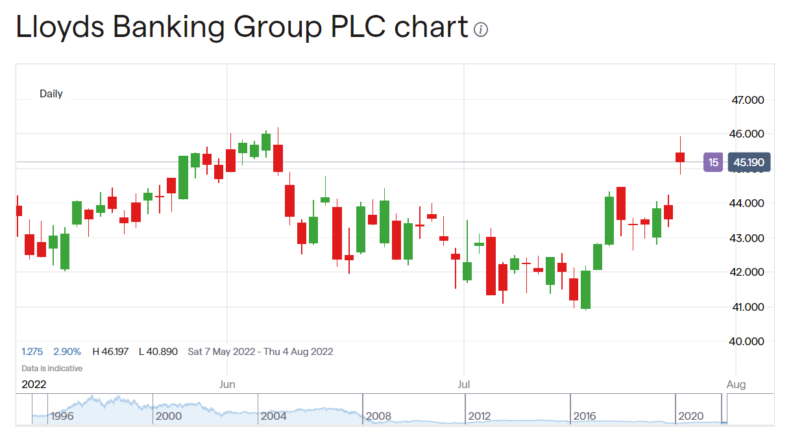Key points:
- Lloyds Bank's profits are down, but that's special factors
- The underlying banking business and margins are growing
- The big question is, well, will there be a recession?
Lloyds Bank (LON: LLOY) shares are up 4.5% this morning on the release of the half year results. The profit is down a £billion (about 25%) on last time but that's a result of technical factors. The underlying business continues to grow in terms of both net revenue and net profit. The underlying there is the continued rise in interest rates. For bank profits do rise as interest rates rise up off the floor. The big question for the future is whether there's going to be a significant recession in the UK economy and if so, will that significantly damage house prices?
The specific results are that profits for the half-year were £2.8 billion (down from £3.9 billion last year) and that fall is that last time around there was a significant write back of impairment provisions (in non-technical speak, losses they thought they would make didn't happen so the saved money to pay for them could be taken as profit) and a tax credit. The underlying business, stripped of those special factors, saw net income up 12% to £8.5 billion. Costs only rose 5%, which is what drives the increase in operating profit as opposed to adjusted.
The big macroeconomic story in these results though is in these two phrases “UK Bank Rate changes” and “a stronger banking net interest margin of 2.77 per cent” which are things we've got to understand about banking in general. The other shoe that hasn't dropped as yet is the other macroeconomic factor – recession and house prices. For, to a certain extent, we can regard Lloyds Bank as a leveraged bet on British house prices. Not entirely, but it's a useful line of thinking to consider.

Also Read: The Best Financial Stocks To Buy Right Now
There are two macroeconomic pressures upon Lloyds Bank, one already evident, the other just a possibility. It's the balance of the two over time which is going to make the difference. The first is that low interest rates artificially compress bank margins. Those margins are determined by the difference between what a bank pays to borrow – what it pays in interest on deposits – and what it can charge on loans. Since very few indeed are prepared to deposit at negative interest rates the low rates of the past decade have compressed those margins. As the base rate rises banking margins are thus increasing. We've looked at this for Lloyds Bank before. So, rising interest rates are good news.
Ah, but, there's always the possibility that the Bank of England will push the economy into recession in order to kill inflation. That would mean significant rises in write offs and provisions against loans – that would not be good for profits. So, we're really looking for the sweet spot, of interest rates rising to more normal levels but without a recession and a house price crash.
Whether we actually get that or not is the risk to Lloyds Bank's shares.




